Report on Entrepreneurship and Small Business Management (HND)
VerifiedAdded on 2021/02/19
|12
|3985
|16
Report
AI Summary
This report delves into entrepreneurship and small business management, focusing on the impact of SMEs on the UK economy. It examines the contributions of SMEs to employment, competition, and innovation, comparing their influence across different UK regions, EU countries, and industries. The report also explores the social economy impact, including improved quality of life and poverty reduction. Furthermore, it differentiates between entrepreneurs and managers, outlining entrepreneurial characteristics, skills, and traits, with a case study of Steph Croft-Simon. The report analyzes the application of the Big Five personality traits and Maslow's Hierarchy of Needs, along with other factors affecting entrepreneurial success, such as background and experience. The content is sourced from a student's assignment and published on Desklib, a platform offering AI-driven study tools.
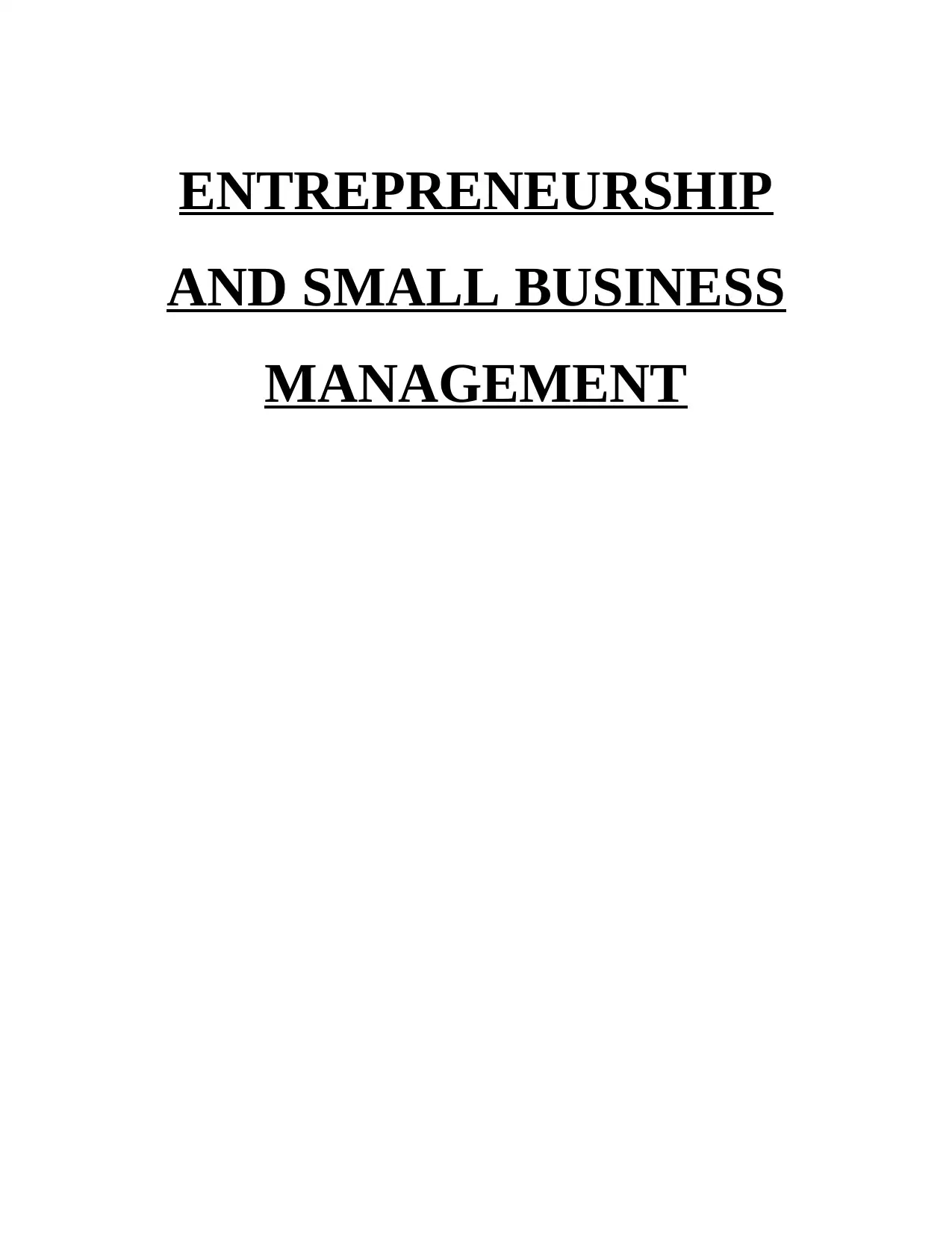
ENTREPRENEURSHIP
AND SMALL BUSINESS
MANAGEMENT
AND SMALL BUSINESS
MANAGEMENT
Paraphrase This Document
Need a fresh take? Get an instant paraphrase of this document with our AI Paraphraser
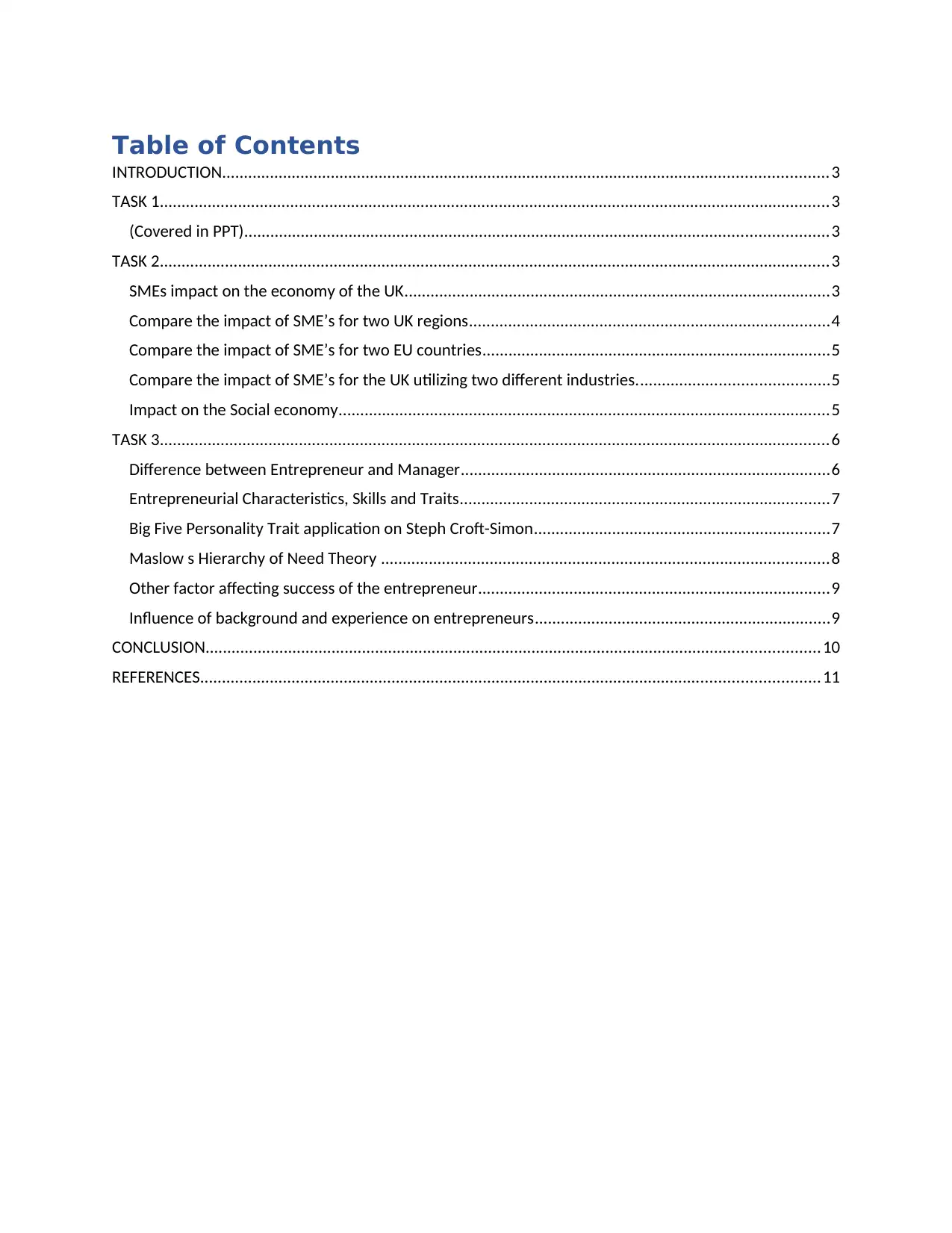
Table of Contents
INTRODUCTION...........................................................................................................................................3
TASK 1..........................................................................................................................................................3
(Covered in PPT)......................................................................................................................................3
TASK 2..........................................................................................................................................................3
SMEs impact on the economy of the UK..................................................................................................3
Compare the impact of SME’s for two UK regions...................................................................................4
Compare the impact of SME’s for two EU countries................................................................................5
Compare the impact of SME’s for the UK utilizing two different industries............................................5
Impact on the Social economy.................................................................................................................5
TASK 3..........................................................................................................................................................6
Difference between Entrepreneur and Manager.....................................................................................6
Entrepreneurial Characteristics, Skills and Traits.....................................................................................7
Big Five Personality Trait application on Steph Croft-Simon....................................................................7
Maslow s Hierarchy of Need Theory .......................................................................................................8
Other factor affecting success of the entrepreneur.................................................................................9
Influence of background and experience on entrepreneurs....................................................................9
CONCLUSION.............................................................................................................................................10
REFERENCES..............................................................................................................................................11
INTRODUCTION...........................................................................................................................................3
TASK 1..........................................................................................................................................................3
(Covered in PPT)......................................................................................................................................3
TASK 2..........................................................................................................................................................3
SMEs impact on the economy of the UK..................................................................................................3
Compare the impact of SME’s for two UK regions...................................................................................4
Compare the impact of SME’s for two EU countries................................................................................5
Compare the impact of SME’s for the UK utilizing two different industries............................................5
Impact on the Social economy.................................................................................................................5
TASK 3..........................................................................................................................................................6
Difference between Entrepreneur and Manager.....................................................................................6
Entrepreneurial Characteristics, Skills and Traits.....................................................................................7
Big Five Personality Trait application on Steph Croft-Simon....................................................................7
Maslow s Hierarchy of Need Theory .......................................................................................................8
Other factor affecting success of the entrepreneur.................................................................................9
Influence of background and experience on entrepreneurs....................................................................9
CONCLUSION.............................................................................................................................................10
REFERENCES..............................................................................................................................................11
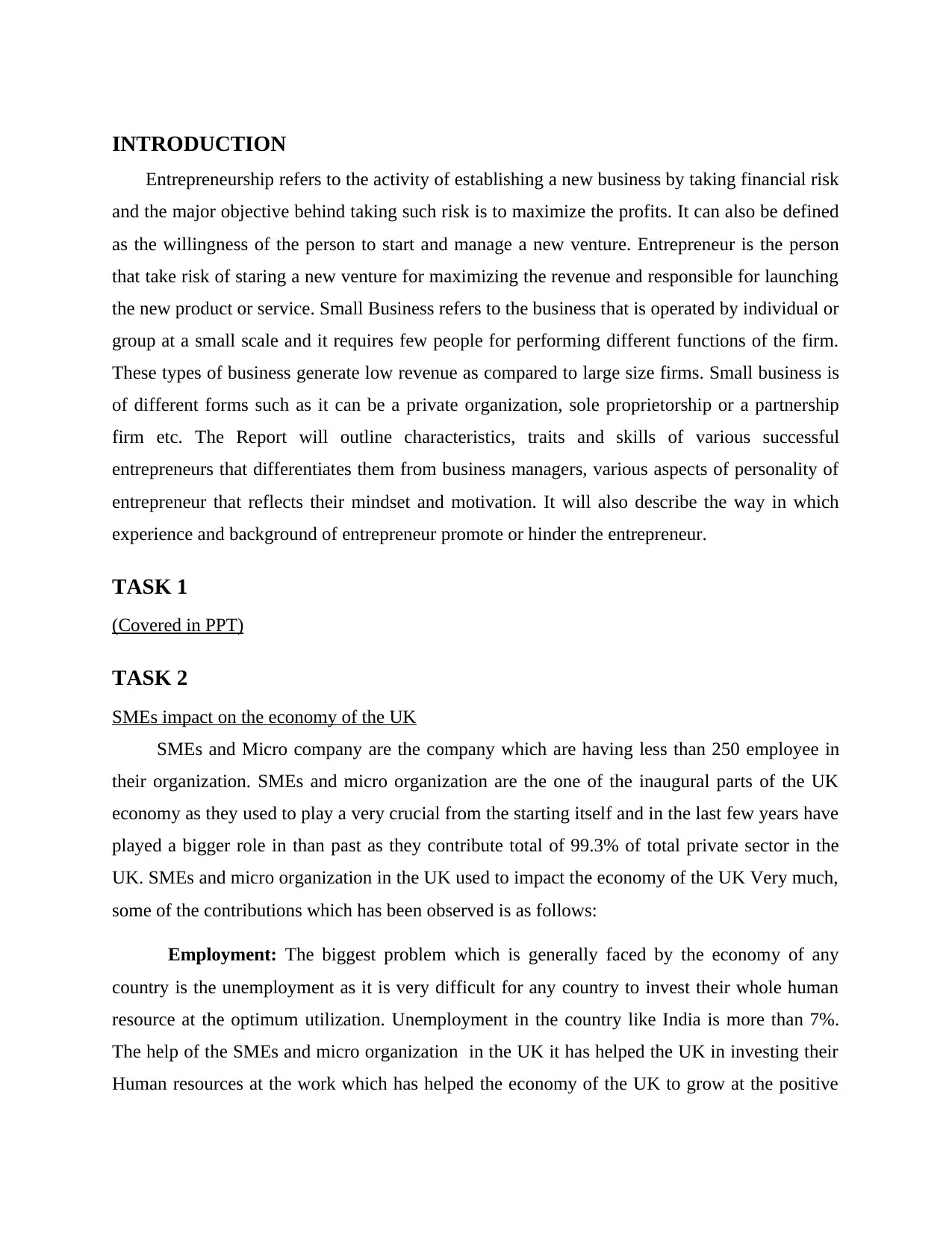
INTRODUCTION
Entrepreneurship refers to the activity of establishing a new business by taking financial risk
and the major objective behind taking such risk is to maximize the profits. It can also be defined
as the willingness of the person to start and manage a new venture. Entrepreneur is the person
that take risk of staring a new venture for maximizing the revenue and responsible for launching
the new product or service. Small Business refers to the business that is operated by individual or
group at a small scale and it requires few people for performing different functions of the firm.
These types of business generate low revenue as compared to large size firms. Small business is
of different forms such as it can be a private organization, sole proprietorship or a partnership
firm etc. The Report will outline characteristics, traits and skills of various successful
entrepreneurs that differentiates them from business managers, various aspects of personality of
entrepreneur that reflects their mindset and motivation. It will also describe the way in which
experience and background of entrepreneur promote or hinder the entrepreneur.
TASK 1
(Covered in PPT)
TASK 2
SMEs impact on the economy of the UK
SMEs and Micro company are the company which are having less than 250 employee in
their organization. SMEs and micro organization are the one of the inaugural parts of the UK
economy as they used to play a very crucial from the starting itself and in the last few years have
played a bigger role in than past as they contribute total of 99.3% of total private sector in the
UK. SMEs and micro organization in the UK used to impact the economy of the UK Very much,
some of the contributions which has been observed is as follows:
Employment: The biggest problem which is generally faced by the economy of any
country is the unemployment as it is very difficult for any country to invest their whole human
resource at the optimum utilization. Unemployment in the country like India is more than 7%.
The help of the SMEs and micro organization in the UK it has helped the UK in investing their
Human resources at the work which has helped the economy of the UK to grow at the positive
Entrepreneurship refers to the activity of establishing a new business by taking financial risk
and the major objective behind taking such risk is to maximize the profits. It can also be defined
as the willingness of the person to start and manage a new venture. Entrepreneur is the person
that take risk of staring a new venture for maximizing the revenue and responsible for launching
the new product or service. Small Business refers to the business that is operated by individual or
group at a small scale and it requires few people for performing different functions of the firm.
These types of business generate low revenue as compared to large size firms. Small business is
of different forms such as it can be a private organization, sole proprietorship or a partnership
firm etc. The Report will outline characteristics, traits and skills of various successful
entrepreneurs that differentiates them from business managers, various aspects of personality of
entrepreneur that reflects their mindset and motivation. It will also describe the way in which
experience and background of entrepreneur promote or hinder the entrepreneur.
TASK 1
(Covered in PPT)
TASK 2
SMEs impact on the economy of the UK
SMEs and Micro company are the company which are having less than 250 employee in
their organization. SMEs and micro organization are the one of the inaugural parts of the UK
economy as they used to play a very crucial from the starting itself and in the last few years have
played a bigger role in than past as they contribute total of 99.3% of total private sector in the
UK. SMEs and micro organization in the UK used to impact the economy of the UK Very much,
some of the contributions which has been observed is as follows:
Employment: The biggest problem which is generally faced by the economy of any
country is the unemployment as it is very difficult for any country to invest their whole human
resource at the optimum utilization. Unemployment in the country like India is more than 7%.
The help of the SMEs and micro organization in the UK it has helped the UK in investing their
Human resources at the work which has helped the economy of the UK to grow at the positive
⊘ This is a preview!⊘
Do you want full access?
Subscribe today to unlock all pages.

Trusted by 1+ million students worldwide
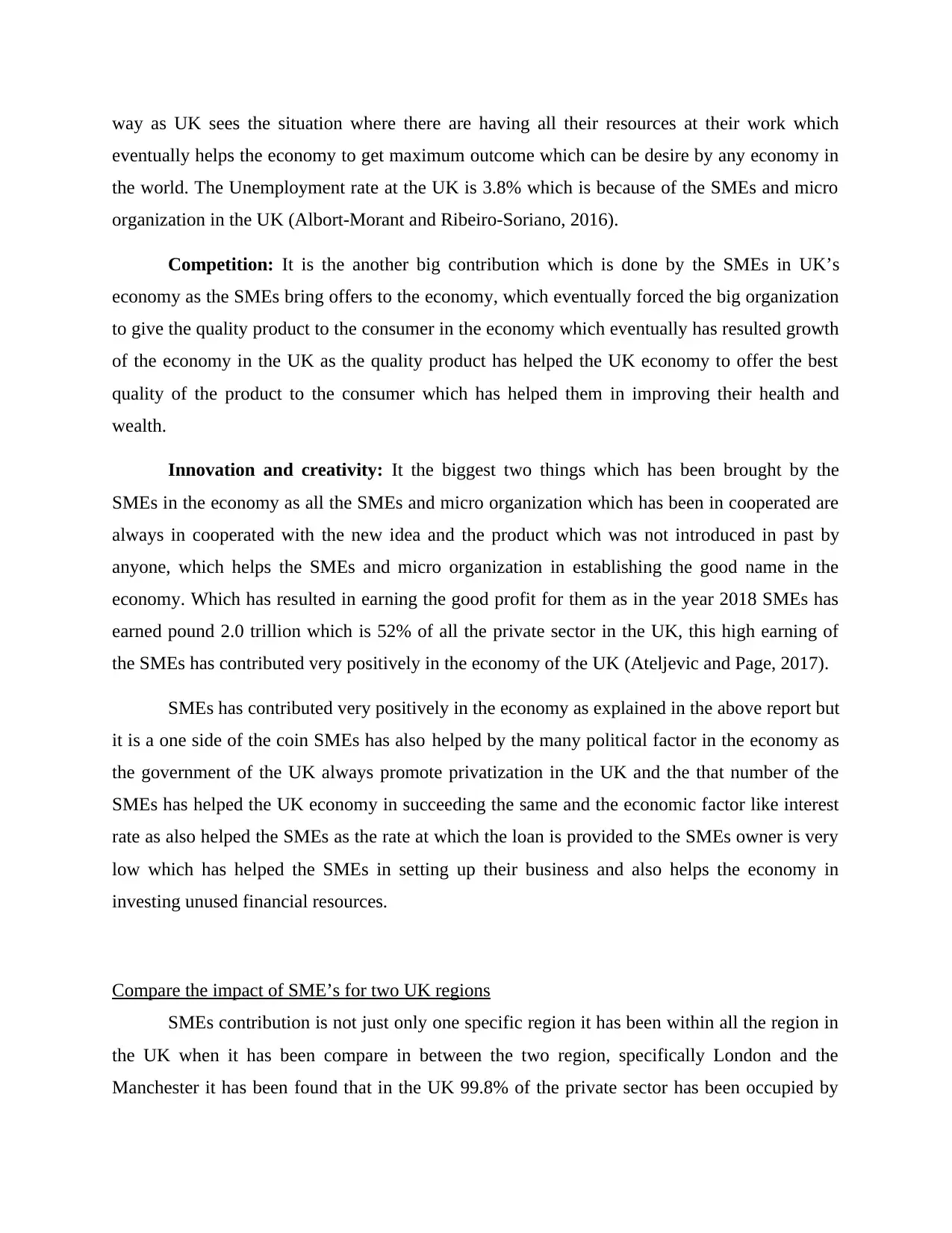
way as UK sees the situation where there are having all their resources at their work which
eventually helps the economy to get maximum outcome which can be desire by any economy in
the world. The Unemployment rate at the UK is 3.8% which is because of the SMEs and micro
organization in the UK (Albort-Morant and Ribeiro-Soriano, 2016).
Competition: It is the another big contribution which is done by the SMEs in UK’s
economy as the SMEs bring offers to the economy, which eventually forced the big organization
to give the quality product to the consumer in the economy which eventually has resulted growth
of the economy in the UK as the quality product has helped the UK economy to offer the best
quality of the product to the consumer which has helped them in improving their health and
wealth.
Innovation and creativity: It the biggest two things which has been brought by the
SMEs in the economy as all the SMEs and micro organization which has been in cooperated are
always in cooperated with the new idea and the product which was not introduced in past by
anyone, which helps the SMEs and micro organization in establishing the good name in the
economy. Which has resulted in earning the good profit for them as in the year 2018 SMEs has
earned pound 2.0 trillion which is 52% of all the private sector in the UK, this high earning of
the SMEs has contributed very positively in the economy of the UK (Ateljevic and Page, 2017).
SMEs has contributed very positively in the economy as explained in the above report but
it is a one side of the coin SMEs has also helped by the many political factor in the economy as
the government of the UK always promote privatization in the UK and the that number of the
SMEs has helped the UK economy in succeeding the same and the economic factor like interest
rate as also helped the SMEs as the rate at which the loan is provided to the SMEs owner is very
low which has helped the SMEs in setting up their business and also helps the economy in
investing unused financial resources.
Compare the impact of SME’s for two UK regions
SMEs contribution is not just only one specific region it has been within all the region in
the UK when it has been compare in between the two region, specifically London and the
Manchester it has been found that in the UK 99.8% of the private sector has been occupied by
eventually helps the economy to get maximum outcome which can be desire by any economy in
the world. The Unemployment rate at the UK is 3.8% which is because of the SMEs and micro
organization in the UK (Albort-Morant and Ribeiro-Soriano, 2016).
Competition: It is the another big contribution which is done by the SMEs in UK’s
economy as the SMEs bring offers to the economy, which eventually forced the big organization
to give the quality product to the consumer in the economy which eventually has resulted growth
of the economy in the UK as the quality product has helped the UK economy to offer the best
quality of the product to the consumer which has helped them in improving their health and
wealth.
Innovation and creativity: It the biggest two things which has been brought by the
SMEs in the economy as all the SMEs and micro organization which has been in cooperated are
always in cooperated with the new idea and the product which was not introduced in past by
anyone, which helps the SMEs and micro organization in establishing the good name in the
economy. Which has resulted in earning the good profit for them as in the year 2018 SMEs has
earned pound 2.0 trillion which is 52% of all the private sector in the UK, this high earning of
the SMEs has contributed very positively in the economy of the UK (Ateljevic and Page, 2017).
SMEs has contributed very positively in the economy as explained in the above report but
it is a one side of the coin SMEs has also helped by the many political factor in the economy as
the government of the UK always promote privatization in the UK and the that number of the
SMEs has helped the UK economy in succeeding the same and the economic factor like interest
rate as also helped the SMEs as the rate at which the loan is provided to the SMEs owner is very
low which has helped the SMEs in setting up their business and also helps the economy in
investing unused financial resources.
Compare the impact of SME’s for two UK regions
SMEs contribution is not just only one specific region it has been within all the region in
the UK when it has been compare in between the two region, specifically London and the
Manchester it has been found that in the UK 99.8% of the private sector has been occupied by
Paraphrase This Document
Need a fresh take? Get an instant paraphrase of this document with our AI Paraphraser
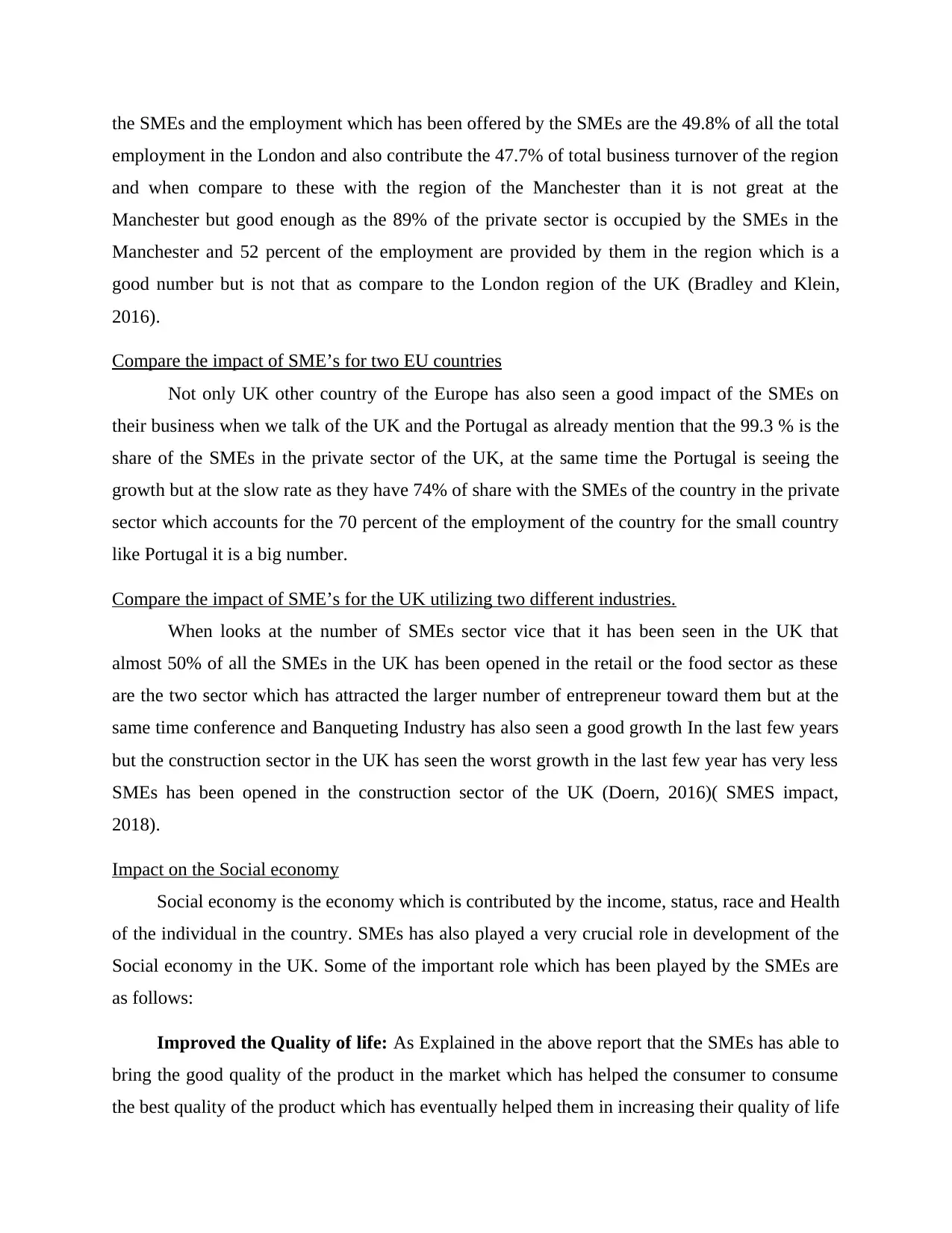
the SMEs and the employment which has been offered by the SMEs are the 49.8% of all the total
employment in the London and also contribute the 47.7% of total business turnover of the region
and when compare to these with the region of the Manchester than it is not great at the
Manchester but good enough as the 89% of the private sector is occupied by the SMEs in the
Manchester and 52 percent of the employment are provided by them in the region which is a
good number but is not that as compare to the London region of the UK (Bradley and Klein,
2016).
Compare the impact of SME’s for two EU countries
Not only UK other country of the Europe has also seen a good impact of the SMEs on
their business when we talk of the UK and the Portugal as already mention that the 99.3 % is the
share of the SMEs in the private sector of the UK, at the same time the Portugal is seeing the
growth but at the slow rate as they have 74% of share with the SMEs of the country in the private
sector which accounts for the 70 percent of the employment of the country for the small country
like Portugal it is a big number.
Compare the impact of SME’s for the UK utilizing two different industries.
When looks at the number of SMEs sector vice that it has been seen in the UK that
almost 50% of all the SMEs in the UK has been opened in the retail or the food sector as these
are the two sector which has attracted the larger number of entrepreneur toward them but at the
same time conference and Banqueting Industry has also seen a good growth In the last few years
but the construction sector in the UK has seen the worst growth in the last few year has very less
SMEs has been opened in the construction sector of the UK (Doern, 2016)( SMES impact,
2018).
Impact on the Social economy
Social economy is the economy which is contributed by the income, status, race and Health
of the individual in the country. SMEs has also played a very crucial role in development of the
Social economy in the UK. Some of the important role which has been played by the SMEs are
as follows:
Improved the Quality of life: As Explained in the above report that the SMEs has able to
bring the good quality of the product in the market which has helped the consumer to consume
the best quality of the product which has eventually helped them in increasing their quality of life
employment in the London and also contribute the 47.7% of total business turnover of the region
and when compare to these with the region of the Manchester than it is not great at the
Manchester but good enough as the 89% of the private sector is occupied by the SMEs in the
Manchester and 52 percent of the employment are provided by them in the region which is a
good number but is not that as compare to the London region of the UK (Bradley and Klein,
2016).
Compare the impact of SME’s for two EU countries
Not only UK other country of the Europe has also seen a good impact of the SMEs on
their business when we talk of the UK and the Portugal as already mention that the 99.3 % is the
share of the SMEs in the private sector of the UK, at the same time the Portugal is seeing the
growth but at the slow rate as they have 74% of share with the SMEs of the country in the private
sector which accounts for the 70 percent of the employment of the country for the small country
like Portugal it is a big number.
Compare the impact of SME’s for the UK utilizing two different industries.
When looks at the number of SMEs sector vice that it has been seen in the UK that
almost 50% of all the SMEs in the UK has been opened in the retail or the food sector as these
are the two sector which has attracted the larger number of entrepreneur toward them but at the
same time conference and Banqueting Industry has also seen a good growth In the last few years
but the construction sector in the UK has seen the worst growth in the last few year has very less
SMEs has been opened in the construction sector of the UK (Doern, 2016)( SMES impact,
2018).
Impact on the Social economy
Social economy is the economy which is contributed by the income, status, race and Health
of the individual in the country. SMEs has also played a very crucial role in development of the
Social economy in the UK. Some of the important role which has been played by the SMEs are
as follows:
Improved the Quality of life: As Explained in the above report that the SMEs has able to
bring the good quality of the product in the market which has helped the consumer to consume
the best quality of the product which has eventually helped them in increasing their quality of life
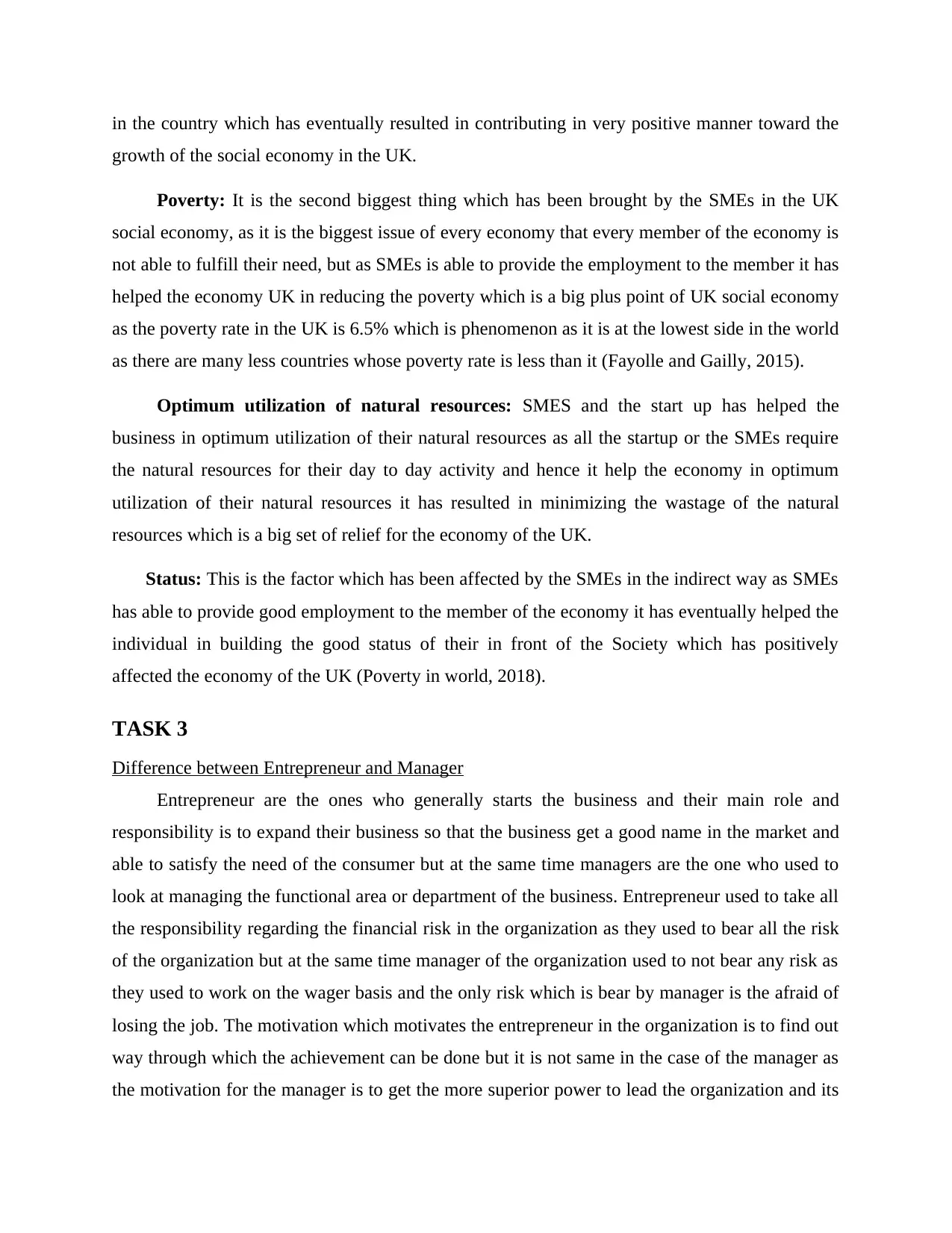
in the country which has eventually resulted in contributing in very positive manner toward the
growth of the social economy in the UK.
Poverty: It is the second biggest thing which has been brought by the SMEs in the UK
social economy, as it is the biggest issue of every economy that every member of the economy is
not able to fulfill their need, but as SMEs is able to provide the employment to the member it has
helped the economy UK in reducing the poverty which is a big plus point of UK social economy
as the poverty rate in the UK is 6.5% which is phenomenon as it is at the lowest side in the world
as there are many less countries whose poverty rate is less than it (Fayolle and Gailly, 2015).
Optimum utilization of natural resources: SMES and the start up has helped the
business in optimum utilization of their natural resources as all the startup or the SMEs require
the natural resources for their day to day activity and hence it help the economy in optimum
utilization of their natural resources it has resulted in minimizing the wastage of the natural
resources which is a big set of relief for the economy of the UK.
Status: This is the factor which has been affected by the SMEs in the indirect way as SMEs
has able to provide good employment to the member of the economy it has eventually helped the
individual in building the good status of their in front of the Society which has positively
affected the economy of the UK (Poverty in world, 2018).
TASK 3
Difference between Entrepreneur and Manager
Entrepreneur are the ones who generally starts the business and their main role and
responsibility is to expand their business so that the business get a good name in the market and
able to satisfy the need of the consumer but at the same time managers are the one who used to
look at managing the functional area or department of the business. Entrepreneur used to take all
the responsibility regarding the financial risk in the organization as they used to bear all the risk
of the organization but at the same time manager of the organization used to not bear any risk as
they used to work on the wager basis and the only risk which is bear by manager is the afraid of
losing the job. The motivation which motivates the entrepreneur in the organization is to find out
way through which the achievement can be done but it is not same in the case of the manager as
the motivation for the manager is to get the more superior power to lead the organization and its
growth of the social economy in the UK.
Poverty: It is the second biggest thing which has been brought by the SMEs in the UK
social economy, as it is the biggest issue of every economy that every member of the economy is
not able to fulfill their need, but as SMEs is able to provide the employment to the member it has
helped the economy UK in reducing the poverty which is a big plus point of UK social economy
as the poverty rate in the UK is 6.5% which is phenomenon as it is at the lowest side in the world
as there are many less countries whose poverty rate is less than it (Fayolle and Gailly, 2015).
Optimum utilization of natural resources: SMES and the start up has helped the
business in optimum utilization of their natural resources as all the startup or the SMEs require
the natural resources for their day to day activity and hence it help the economy in optimum
utilization of their natural resources it has resulted in minimizing the wastage of the natural
resources which is a big set of relief for the economy of the UK.
Status: This is the factor which has been affected by the SMEs in the indirect way as SMEs
has able to provide good employment to the member of the economy it has eventually helped the
individual in building the good status of their in front of the Society which has positively
affected the economy of the UK (Poverty in world, 2018).
TASK 3
Difference between Entrepreneur and Manager
Entrepreneur are the ones who generally starts the business and their main role and
responsibility is to expand their business so that the business get a good name in the market and
able to satisfy the need of the consumer but at the same time managers are the one who used to
look at managing the functional area or department of the business. Entrepreneur used to take all
the responsibility regarding the financial risk in the organization as they used to bear all the risk
of the organization but at the same time manager of the organization used to not bear any risk as
they used to work on the wager basis and the only risk which is bear by manager is the afraid of
losing the job. The motivation which motivates the entrepreneur in the organization is to find out
way through which the achievement can be done but it is not same in the case of the manager as
the motivation for the manager is to get the more superior power to lead the organization and its
⊘ This is a preview!⊘
Do you want full access?
Subscribe today to unlock all pages.

Trusted by 1+ million students worldwide
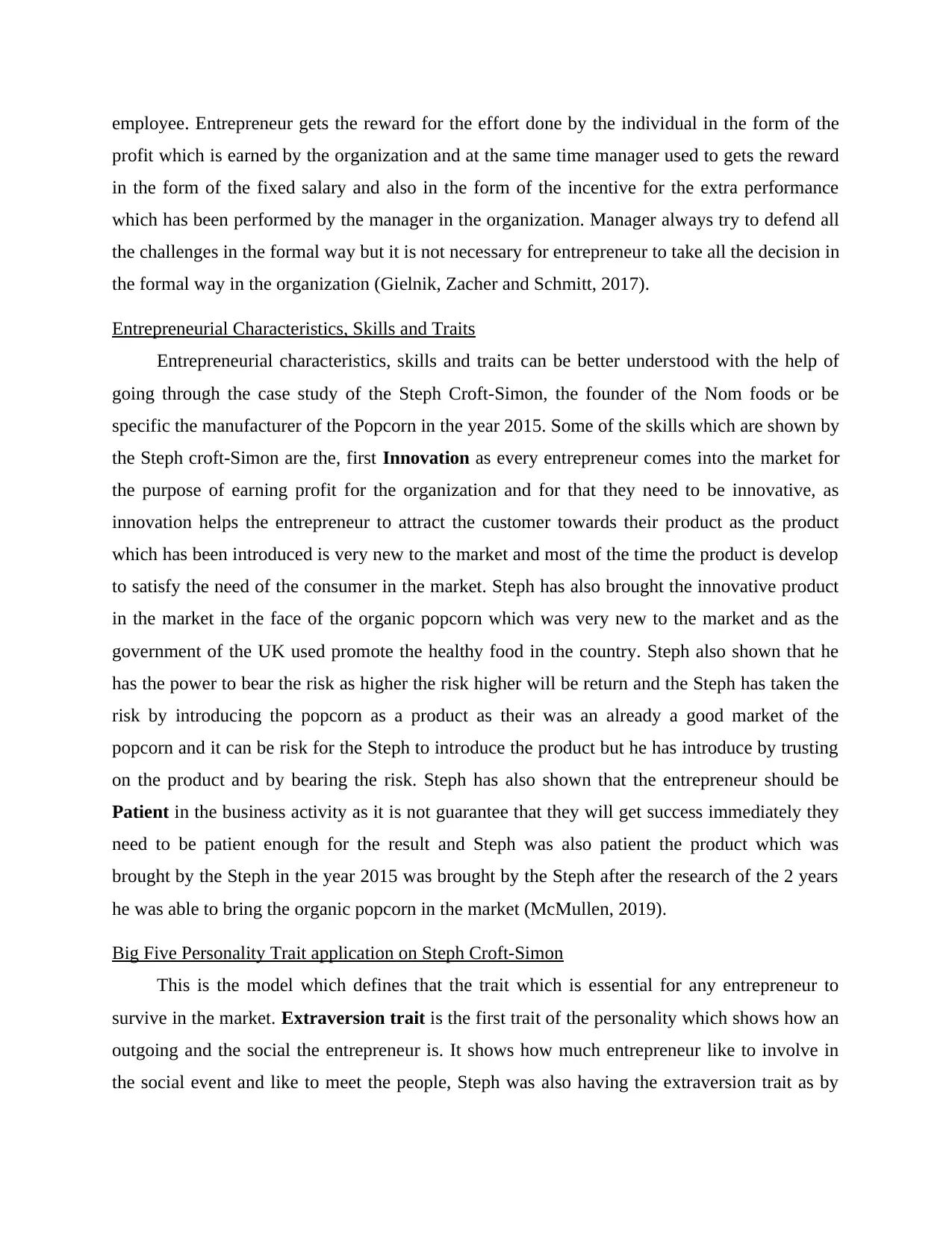
employee. Entrepreneur gets the reward for the effort done by the individual in the form of the
profit which is earned by the organization and at the same time manager used to gets the reward
in the form of the fixed salary and also in the form of the incentive for the extra performance
which has been performed by the manager in the organization. Manager always try to defend all
the challenges in the formal way but it is not necessary for entrepreneur to take all the decision in
the formal way in the organization (Gielnik, Zacher and Schmitt, 2017).
Entrepreneurial Characteristics, Skills and Traits
Entrepreneurial characteristics, skills and traits can be better understood with the help of
going through the case study of the Steph Croft-Simon, the founder of the Nom foods or be
specific the manufacturer of the Popcorn in the year 2015. Some of the skills which are shown by
the Steph croft-Simon are the, first Innovation as every entrepreneur comes into the market for
the purpose of earning profit for the organization and for that they need to be innovative, as
innovation helps the entrepreneur to attract the customer towards their product as the product
which has been introduced is very new to the market and most of the time the product is develop
to satisfy the need of the consumer in the market. Steph has also brought the innovative product
in the market in the face of the organic popcorn which was very new to the market and as the
government of the UK used promote the healthy food in the country. Steph also shown that he
has the power to bear the risk as higher the risk higher will be return and the Steph has taken the
risk by introducing the popcorn as a product as their was an already a good market of the
popcorn and it can be risk for the Steph to introduce the product but he has introduce by trusting
on the product and by bearing the risk. Steph has also shown that the entrepreneur should be
Patient in the business activity as it is not guarantee that they will get success immediately they
need to be patient enough for the result and Steph was also patient the product which was
brought by the Steph in the year 2015 was brought by the Steph after the research of the 2 years
he was able to bring the organic popcorn in the market (McMullen, 2019).
Big Five Personality Trait application on Steph Croft-Simon
This is the model which defines that the trait which is essential for any entrepreneur to
survive in the market. Extraversion trait is the first trait of the personality which shows how an
outgoing and the social the entrepreneur is. It shows how much entrepreneur like to involve in
the social event and like to meet the people, Steph was also having the extraversion trait as by
profit which is earned by the organization and at the same time manager used to gets the reward
in the form of the fixed salary and also in the form of the incentive for the extra performance
which has been performed by the manager in the organization. Manager always try to defend all
the challenges in the formal way but it is not necessary for entrepreneur to take all the decision in
the formal way in the organization (Gielnik, Zacher and Schmitt, 2017).
Entrepreneurial Characteristics, Skills and Traits
Entrepreneurial characteristics, skills and traits can be better understood with the help of
going through the case study of the Steph Croft-Simon, the founder of the Nom foods or be
specific the manufacturer of the Popcorn in the year 2015. Some of the skills which are shown by
the Steph croft-Simon are the, first Innovation as every entrepreneur comes into the market for
the purpose of earning profit for the organization and for that they need to be innovative, as
innovation helps the entrepreneur to attract the customer towards their product as the product
which has been introduced is very new to the market and most of the time the product is develop
to satisfy the need of the consumer in the market. Steph has also brought the innovative product
in the market in the face of the organic popcorn which was very new to the market and as the
government of the UK used promote the healthy food in the country. Steph also shown that he
has the power to bear the risk as higher the risk higher will be return and the Steph has taken the
risk by introducing the popcorn as a product as their was an already a good market of the
popcorn and it can be risk for the Steph to introduce the product but he has introduce by trusting
on the product and by bearing the risk. Steph has also shown that the entrepreneur should be
Patient in the business activity as it is not guarantee that they will get success immediately they
need to be patient enough for the result and Steph was also patient the product which was
brought by the Steph in the year 2015 was brought by the Steph after the research of the 2 years
he was able to bring the organic popcorn in the market (McMullen, 2019).
Big Five Personality Trait application on Steph Croft-Simon
This is the model which defines that the trait which is essential for any entrepreneur to
survive in the market. Extraversion trait is the first trait of the personality which shows how an
outgoing and the social the entrepreneur is. It shows how much entrepreneur like to involve in
the social event and like to meet the people, Steph was also having the extraversion trait as by
Paraphrase This Document
Need a fresh take? Get an instant paraphrase of this document with our AI Paraphraser
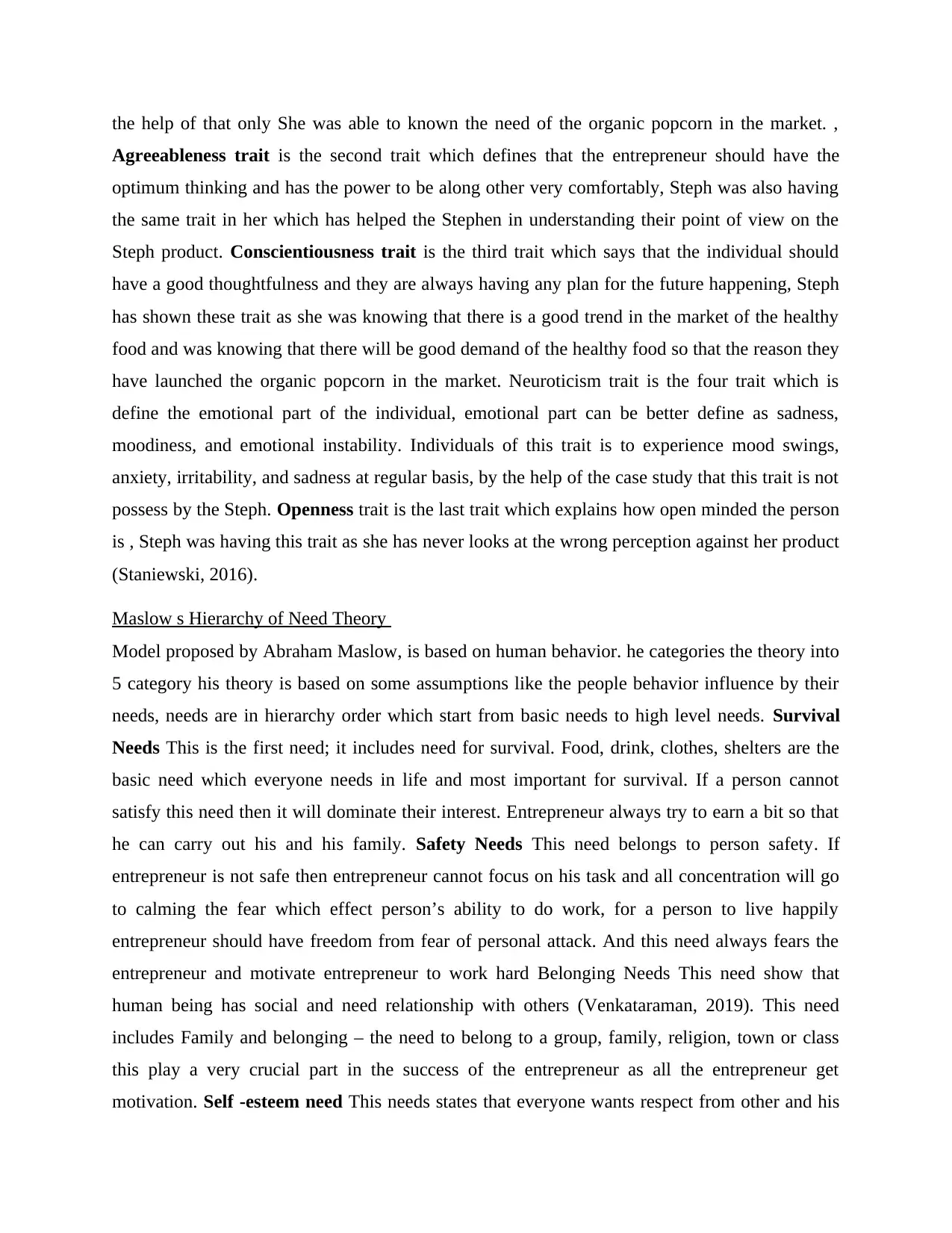
the help of that only She was able to known the need of the organic popcorn in the market. ,
Agreeableness trait is the second trait which defines that the entrepreneur should have the
optimum thinking and has the power to be along other very comfortably, Steph was also having
the same trait in her which has helped the Stephen in understanding their point of view on the
Steph product. Conscientiousness trait is the third trait which says that the individual should
have a good thoughtfulness and they are always having any plan for the future happening, Steph
has shown these trait as she was knowing that there is a good trend in the market of the healthy
food and was knowing that there will be good demand of the healthy food so that the reason they
have launched the organic popcorn in the market. Neuroticism trait is the four trait which is
define the emotional part of the individual, emotional part can be better define as sadness,
moodiness, and emotional instability. Individuals of this trait is to experience mood swings,
anxiety, irritability, and sadness at regular basis, by the help of the case study that this trait is not
possess by the Steph. Openness trait is the last trait which explains how open minded the person
is , Steph was having this trait as she has never looks at the wrong perception against her product
(Staniewski, 2016).
Maslow s Hierarchy of Need Theory
Model proposed by Abraham Maslow, is based on human behavior. he categories the theory into
5 category his theory is based on some assumptions like the people behavior influence by their
needs, needs are in hierarchy order which start from basic needs to high level needs. Survival
Needs This is the first need; it includes need for survival. Food, drink, clothes, shelters are the
basic need which everyone needs in life and most important for survival. If a person cannot
satisfy this need then it will dominate their interest. Entrepreneur always try to earn a bit so that
he can carry out his and his family. Safety Needs This need belongs to person safety. If
entrepreneur is not safe then entrepreneur cannot focus on his task and all concentration will go
to calming the fear which effect person’s ability to do work, for a person to live happily
entrepreneur should have freedom from fear of personal attack. And this need always fears the
entrepreneur and motivate entrepreneur to work hard Belonging Needs This need show that
human being has social and need relationship with others (Venkataraman, 2019). This need
includes Family and belonging – the need to belong to a group, family, religion, town or class
this play a very crucial part in the success of the entrepreneur as all the entrepreneur get
motivation. Self -esteem need This needs states that everyone wants respect from other and his
Agreeableness trait is the second trait which defines that the entrepreneur should have the
optimum thinking and has the power to be along other very comfortably, Steph was also having
the same trait in her which has helped the Stephen in understanding their point of view on the
Steph product. Conscientiousness trait is the third trait which says that the individual should
have a good thoughtfulness and they are always having any plan for the future happening, Steph
has shown these trait as she was knowing that there is a good trend in the market of the healthy
food and was knowing that there will be good demand of the healthy food so that the reason they
have launched the organic popcorn in the market. Neuroticism trait is the four trait which is
define the emotional part of the individual, emotional part can be better define as sadness,
moodiness, and emotional instability. Individuals of this trait is to experience mood swings,
anxiety, irritability, and sadness at regular basis, by the help of the case study that this trait is not
possess by the Steph. Openness trait is the last trait which explains how open minded the person
is , Steph was having this trait as she has never looks at the wrong perception against her product
(Staniewski, 2016).
Maslow s Hierarchy of Need Theory
Model proposed by Abraham Maslow, is based on human behavior. he categories the theory into
5 category his theory is based on some assumptions like the people behavior influence by their
needs, needs are in hierarchy order which start from basic needs to high level needs. Survival
Needs This is the first need; it includes need for survival. Food, drink, clothes, shelters are the
basic need which everyone needs in life and most important for survival. If a person cannot
satisfy this need then it will dominate their interest. Entrepreneur always try to earn a bit so that
he can carry out his and his family. Safety Needs This need belongs to person safety. If
entrepreneur is not safe then entrepreneur cannot focus on his task and all concentration will go
to calming the fear which effect person’s ability to do work, for a person to live happily
entrepreneur should have freedom from fear of personal attack. And this need always fears the
entrepreneur and motivate entrepreneur to work hard Belonging Needs This need show that
human being has social and need relationship with others (Venkataraman, 2019). This need
includes Family and belonging – the need to belong to a group, family, religion, town or class
this play a very crucial part in the success of the entrepreneur as all the entrepreneur get
motivation. Self -esteem need This needs states that everyone wants respect from other and his
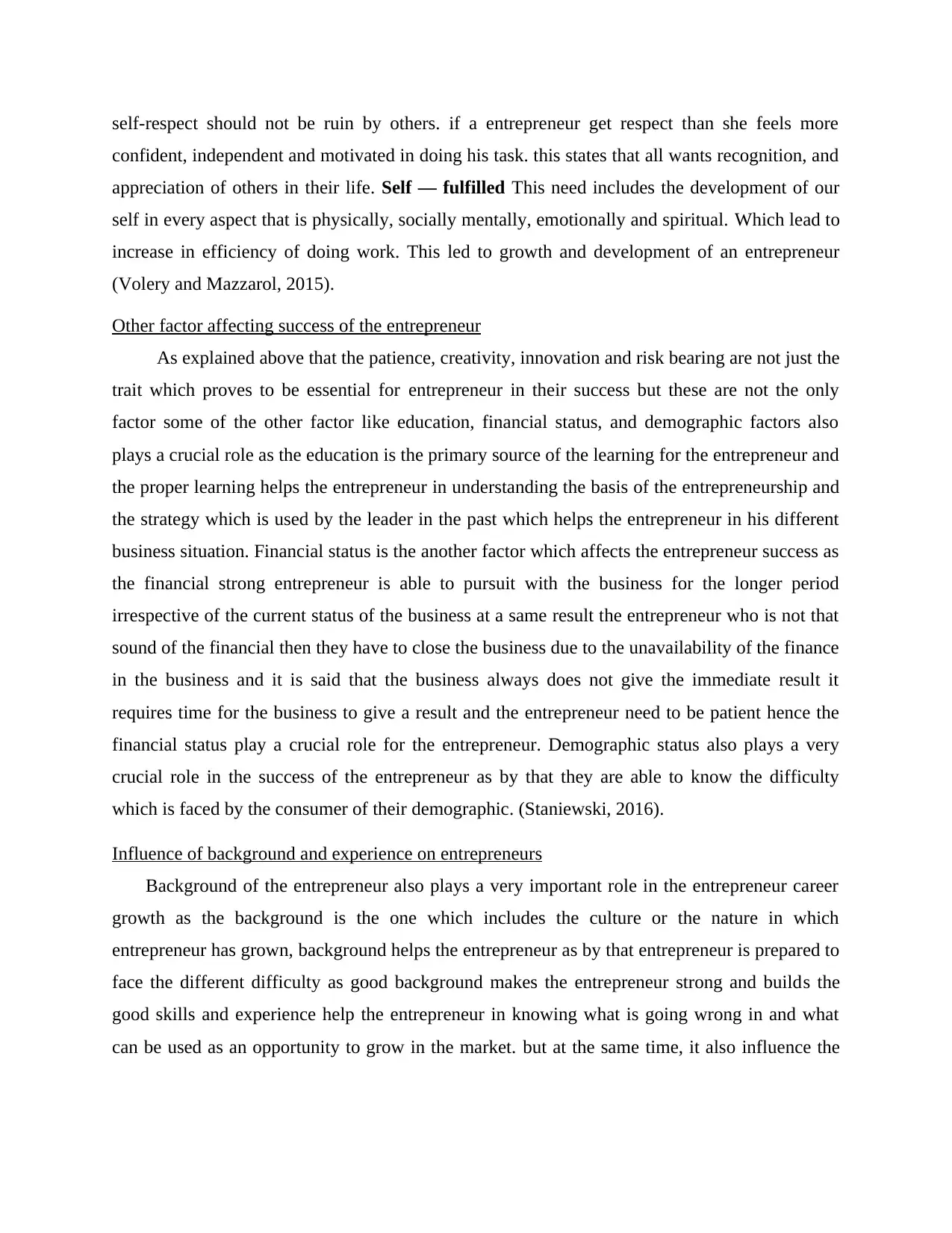
self-respect should not be ruin by others. if a entrepreneur get respect than she feels more
confident, independent and motivated in doing his task. this states that all wants recognition, and
appreciation of others in their life. Self — fulfilled This need includes the development of our
self in every aspect that is physically, socially mentally, emotionally and spiritual. Which lead to
increase in efficiency of doing work. This led to growth and development of an entrepreneur
(Volery and Mazzarol, 2015).
Other factor affecting success of the entrepreneur
As explained above that the patience, creativity, innovation and risk bearing are not just the
trait which proves to be essential for entrepreneur in their success but these are not the only
factor some of the other factor like education, financial status, and demographic factors also
plays a crucial role as the education is the primary source of the learning for the entrepreneur and
the proper learning helps the entrepreneur in understanding the basis of the entrepreneurship and
the strategy which is used by the leader in the past which helps the entrepreneur in his different
business situation. Financial status is the another factor which affects the entrepreneur success as
the financial strong entrepreneur is able to pursuit with the business for the longer period
irrespective of the current status of the business at a same result the entrepreneur who is not that
sound of the financial then they have to close the business due to the unavailability of the finance
in the business and it is said that the business always does not give the immediate result it
requires time for the business to give a result and the entrepreneur need to be patient hence the
financial status play a crucial role for the entrepreneur. Demographic status also plays a very
crucial role in the success of the entrepreneur as by that they are able to know the difficulty
which is faced by the consumer of their demographic. (Staniewski, 2016).
Influence of background and experience on entrepreneurs
Background of the entrepreneur also plays a very important role in the entrepreneur career
growth as the background is the one which includes the culture or the nature in which
entrepreneur has grown, background helps the entrepreneur as by that entrepreneur is prepared to
face the different difficulty as good background makes the entrepreneur strong and builds the
good skills and experience help the entrepreneur in knowing what is going wrong in and what
can be used as an opportunity to grow in the market. but at the same time, it also influence the
confident, independent and motivated in doing his task. this states that all wants recognition, and
appreciation of others in their life. Self — fulfilled This need includes the development of our
self in every aspect that is physically, socially mentally, emotionally and spiritual. Which lead to
increase in efficiency of doing work. This led to growth and development of an entrepreneur
(Volery and Mazzarol, 2015).
Other factor affecting success of the entrepreneur
As explained above that the patience, creativity, innovation and risk bearing are not just the
trait which proves to be essential for entrepreneur in their success but these are not the only
factor some of the other factor like education, financial status, and demographic factors also
plays a crucial role as the education is the primary source of the learning for the entrepreneur and
the proper learning helps the entrepreneur in understanding the basis of the entrepreneurship and
the strategy which is used by the leader in the past which helps the entrepreneur in his different
business situation. Financial status is the another factor which affects the entrepreneur success as
the financial strong entrepreneur is able to pursuit with the business for the longer period
irrespective of the current status of the business at a same result the entrepreneur who is not that
sound of the financial then they have to close the business due to the unavailability of the finance
in the business and it is said that the business always does not give the immediate result it
requires time for the business to give a result and the entrepreneur need to be patient hence the
financial status play a crucial role for the entrepreneur. Demographic status also plays a very
crucial role in the success of the entrepreneur as by that they are able to know the difficulty
which is faced by the consumer of their demographic. (Staniewski, 2016).
Influence of background and experience on entrepreneurs
Background of the entrepreneur also plays a very important role in the entrepreneur career
growth as the background is the one which includes the culture or the nature in which
entrepreneur has grown, background helps the entrepreneur as by that entrepreneur is prepared to
face the different difficulty as good background makes the entrepreneur strong and builds the
good skills and experience help the entrepreneur in knowing what is going wrong in and what
can be used as an opportunity to grow in the market. but at the same time, it also influence the
⊘ This is a preview!⊘
Do you want full access?
Subscribe today to unlock all pages.

Trusted by 1+ million students worldwide
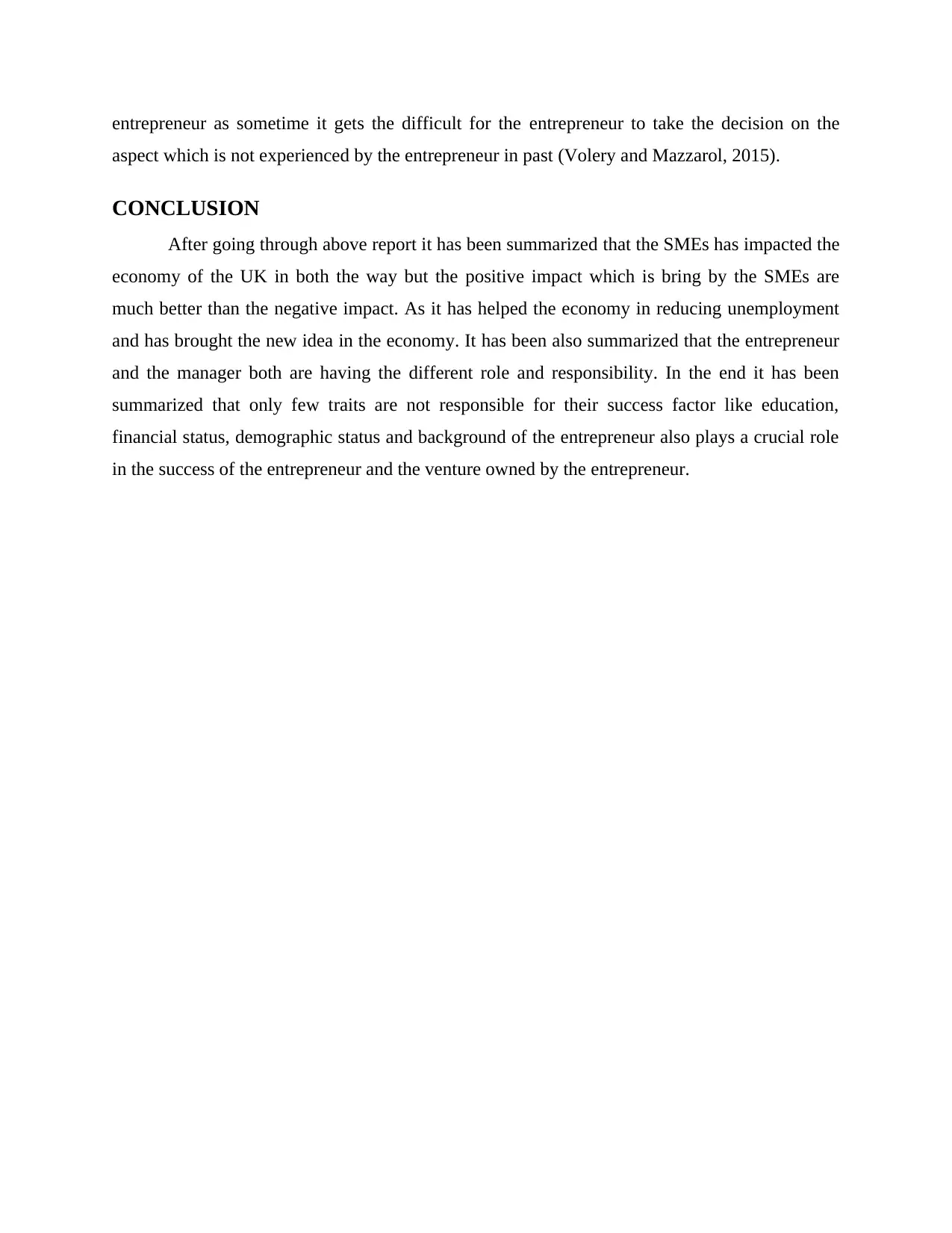
entrepreneur as sometime it gets the difficult for the entrepreneur to take the decision on the
aspect which is not experienced by the entrepreneur in past (Volery and Mazzarol, 2015).
CONCLUSION
After going through above report it has been summarized that the SMEs has impacted the
economy of the UK in both the way but the positive impact which is bring by the SMEs are
much better than the negative impact. As it has helped the economy in reducing unemployment
and has brought the new idea in the economy. It has been also summarized that the entrepreneur
and the manager both are having the different role and responsibility. In the end it has been
summarized that only few traits are not responsible for their success factor like education,
financial status, demographic status and background of the entrepreneur also plays a crucial role
in the success of the entrepreneur and the venture owned by the entrepreneur.
aspect which is not experienced by the entrepreneur in past (Volery and Mazzarol, 2015).
CONCLUSION
After going through above report it has been summarized that the SMEs has impacted the
economy of the UK in both the way but the positive impact which is bring by the SMEs are
much better than the negative impact. As it has helped the economy in reducing unemployment
and has brought the new idea in the economy. It has been also summarized that the entrepreneur
and the manager both are having the different role and responsibility. In the end it has been
summarized that only few traits are not responsible for their success factor like education,
financial status, demographic status and background of the entrepreneur also plays a crucial role
in the success of the entrepreneur and the venture owned by the entrepreneur.
Paraphrase This Document
Need a fresh take? Get an instant paraphrase of this document with our AI Paraphraser
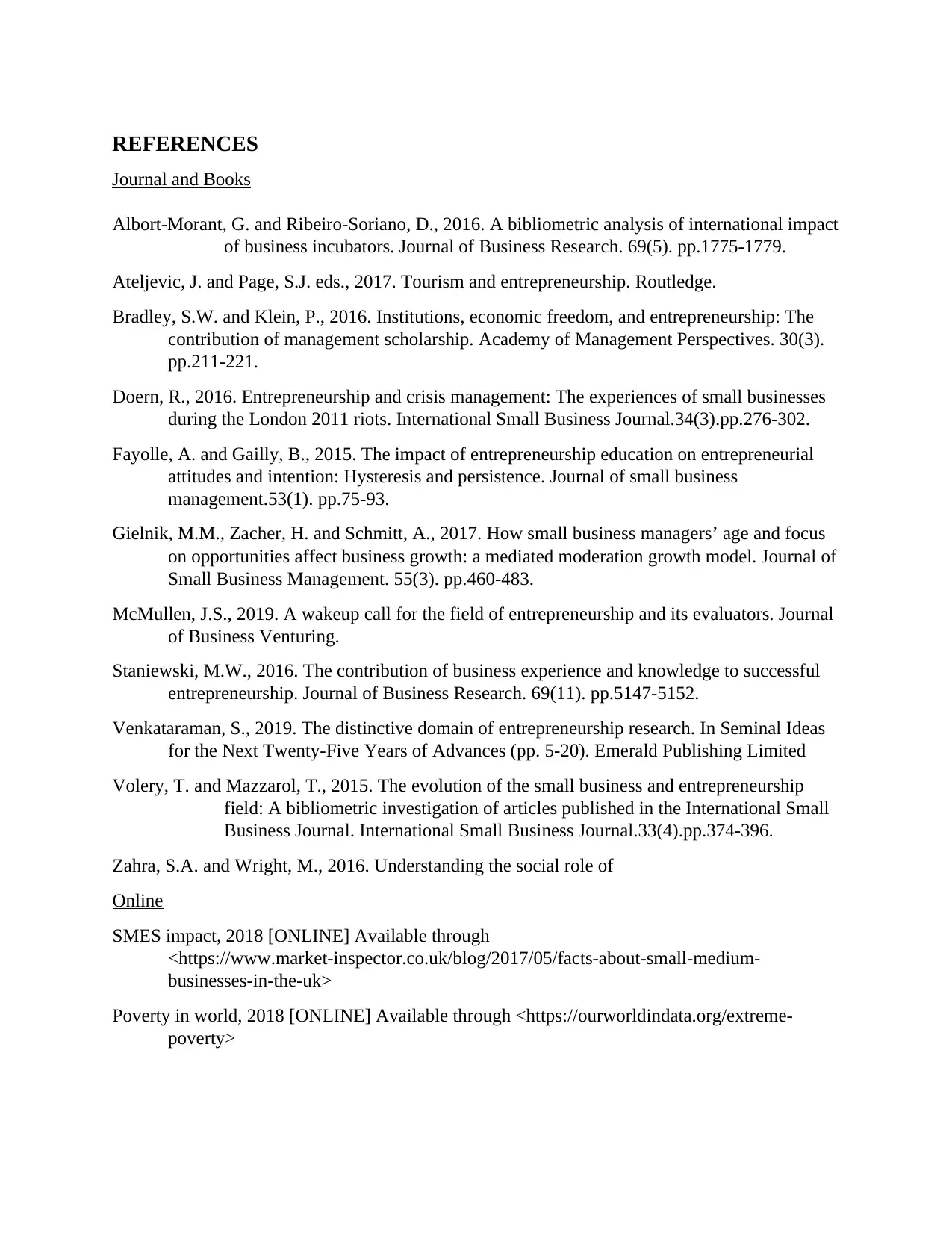
REFERENCES
Journal and Books
Albort-Morant, G. and Ribeiro-Soriano, D., 2016. A bibliometric analysis of international impact
of business incubators. Journal of Business Research. 69(5). pp.1775-1779.
Ateljevic, J. and Page, S.J. eds., 2017. Tourism and entrepreneurship. Routledge.
Bradley, S.W. and Klein, P., 2016. Institutions, economic freedom, and entrepreneurship: The
contribution of management scholarship. Academy of Management Perspectives. 30(3).
pp.211-221.
Doern, R., 2016. Entrepreneurship and crisis management: The experiences of small businesses
during the London 2011 riots. International Small Business Journal.34(3).pp.276-302.
Fayolle, A. and Gailly, B., 2015. The impact of entrepreneurship education on entrepreneurial
attitudes and intention: Hysteresis and persistence. Journal of small business
management.53(1). pp.75-93.
Gielnik, M.M., Zacher, H. and Schmitt, A., 2017. How small business managers’ age and focus
on opportunities affect business growth: a mediated moderation growth model. Journal of
Small Business Management. 55(3). pp.460-483.
McMullen, J.S., 2019. A wakeup call for the field of entrepreneurship and its evaluators. Journal
of Business Venturing.
Staniewski, M.W., 2016. The contribution of business experience and knowledge to successful
entrepreneurship. Journal of Business Research. 69(11). pp.5147-5152.
Venkataraman, S., 2019. The distinctive domain of entrepreneurship research. In Seminal Ideas
for the Next Twenty-Five Years of Advances (pp. 5-20). Emerald Publishing Limited
Volery, T. and Mazzarol, T., 2015. The evolution of the small business and entrepreneurship
field: A bibliometric investigation of articles published in the International Small
Business Journal. International Small Business Journal.33(4).pp.374-396.
Zahra, S.A. and Wright, M., 2016. Understanding the social role of
Online
SMES impact, 2018 [ONLINE] Available through
<https://www.market-inspector.co.uk/blog/2017/05/facts-about-small-medium-
businesses-in-the-uk>
Poverty in world, 2018 [ONLINE] Available through <https://ourworldindata.org/extreme-
poverty>
Journal and Books
Albort-Morant, G. and Ribeiro-Soriano, D., 2016. A bibliometric analysis of international impact
of business incubators. Journal of Business Research. 69(5). pp.1775-1779.
Ateljevic, J. and Page, S.J. eds., 2017. Tourism and entrepreneurship. Routledge.
Bradley, S.W. and Klein, P., 2016. Institutions, economic freedom, and entrepreneurship: The
contribution of management scholarship. Academy of Management Perspectives. 30(3).
pp.211-221.
Doern, R., 2016. Entrepreneurship and crisis management: The experiences of small businesses
during the London 2011 riots. International Small Business Journal.34(3).pp.276-302.
Fayolle, A. and Gailly, B., 2015. The impact of entrepreneurship education on entrepreneurial
attitudes and intention: Hysteresis and persistence. Journal of small business
management.53(1). pp.75-93.
Gielnik, M.M., Zacher, H. and Schmitt, A., 2017. How small business managers’ age and focus
on opportunities affect business growth: a mediated moderation growth model. Journal of
Small Business Management. 55(3). pp.460-483.
McMullen, J.S., 2019. A wakeup call for the field of entrepreneurship and its evaluators. Journal
of Business Venturing.
Staniewski, M.W., 2016. The contribution of business experience and knowledge to successful
entrepreneurship. Journal of Business Research. 69(11). pp.5147-5152.
Venkataraman, S., 2019. The distinctive domain of entrepreneurship research. In Seminal Ideas
for the Next Twenty-Five Years of Advances (pp. 5-20). Emerald Publishing Limited
Volery, T. and Mazzarol, T., 2015. The evolution of the small business and entrepreneurship
field: A bibliometric investigation of articles published in the International Small
Business Journal. International Small Business Journal.33(4).pp.374-396.
Zahra, S.A. and Wright, M., 2016. Understanding the social role of
Online
SMES impact, 2018 [ONLINE] Available through
<https://www.market-inspector.co.uk/blog/2017/05/facts-about-small-medium-
businesses-in-the-uk>
Poverty in world, 2018 [ONLINE] Available through <https://ourworldindata.org/extreme-
poverty>

⊘ This is a preview!⊘
Do you want full access?
Subscribe today to unlock all pages.

Trusted by 1+ million students worldwide
1 out of 12
Related Documents
Your All-in-One AI-Powered Toolkit for Academic Success.
+13062052269
info@desklib.com
Available 24*7 on WhatsApp / Email
![[object Object]](/_next/static/media/star-bottom.7253800d.svg)
Unlock your academic potential
Copyright © 2020–2026 A2Z Services. All Rights Reserved. Developed and managed by ZUCOL.





